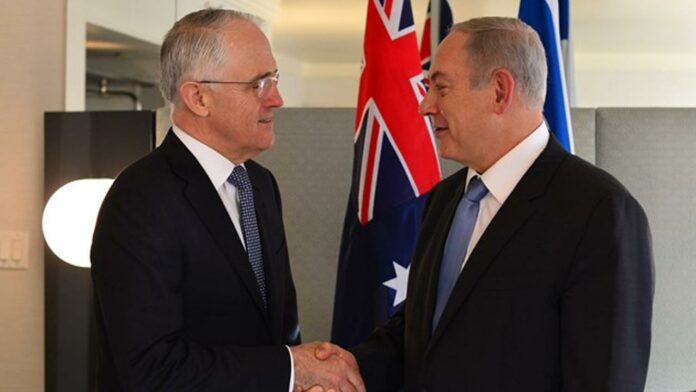In 2017, Israeli high-tech exits totaled $23b billion and 14 Israeli companies are listed on the Australian stock exchange and the scope of bilateral trade between Israel and Australia is estimated at $2 billion annually. There are also other mutually beneficial exchanges underpinned, as Turnbull has said, by the two nations “bound together first and foremost by the values we share — a mutual commitment to freedom, democracy and the rule of law.”
Australia has recently launched an innovation “landing pad” in Tel Aviv geared toward assisting Australian start-ups gain vital knowledge from one of the world’s foremost technology hubs. Like the recently started New Zealand delegations, Australian trade delegations have visited Israel since 1989, exposing Aussie commercial leaders to more than 290 Israeli based venture capital, angel investor and micro funds; 350-plus multinationals like Google, Microsoft, Apple, Facebook and Samsung with Israel offices; 25 startup incubators across Israel; 70 accelerators and 5000 start-ups, as well as 282 research and development centres – it’s no wonder a leading Israeli venture capitalist remarked “It just seems like it’s raining Aussies on us.”
Israeli Prime Minister, Benjamin Netanyahu, made an historic visit to Australia in October, 2017, coinciding with joint celebrations being prepared to mark the 100th anniversary of the ANZAC battle at Be’er Sheva. The visit was as much about valuing old relationships and honouring timeless values as it was about building young futures together, with both leaders seeking to enhance further an already strong mutual economic and diplomatic relationship.
A new R&D agreement signed during the recent visit is expected to strengthen economic ties between the two countries and enable companies from Israel and Australia to receive funding for joint projects in research and development.
Australia has also benefited from the experience of Israel in dealing with cybercrime, and crisis management – the New South Wales Police Commissioner visited Tel Aviv last year, following in the footsteps of New York Mayor Rudolph Giuliani. Prime Minister Turnbull spoke of some of the benefits in his welcome to Netanyahu
While in Australia, Prime Minister Netanyahu and I will oversee the signing of an air services agreement to enhance air links; explore opportunities for greater collaboration in cyberspace; commit to negotiations on an agreement on science and technology co-operation; and announce a declaration of intent to create a fully operational and commercial farm around Wagga Wagga. The new facilities will provide Australian farmers with an opportunity to benefit from world-leading Israeli dairy and agricultural technology.”Malcolm Turnbull
Last year Private NZ industry sent a trade delegation to Israel to survey the high growth, high margin, transformative technologies that make Israel the world’s ‘Start up Nation’. That delegation was led by Spark CEO Simon Moutter and was close to signing a bilateral innovation agreement before Foreign Minister Murray McCully co-sponsored UNSC resolution 2334.
Private innovation initiatives between New Zealand and Israel are moving forward despite the New Zealand Government’s diplomatic fumbling. CropX is a prime example. Last year Eric Schmidt, the ex CEO of Google, and others invested a combined USD$10m into the start-up, which leverages Israeli sensor and communication technologies and New Zealand soil IP to help farmers increase yield and reduce waste.
The innovative deal, backed by some of the world’s most influential technology investors and multinationals would not have happened without Israeli involvement and is but a small example of what could be achieved in substantial order if New Zealand put more focus on its trade and investment relationship with Israel.
In another case study from 2011, Israeli dairy company Afimilk led a $500 million turnkey project in Vietnam. Israel provided the specialist knowledge and soft analytics technology and New Zealand provided over 30,000 cows and hardware.
And this year it was revealed that a novel material for joint replacement surgery being developed in Israel saw its first clinical trial in New Zealand. There are bound to be many, many more private research and development, innovation, and business relationships that do not make news.
While New Zealand stands apart from Australia (and Canada and the United States and other traditional allies) in anti-Israel voting at the United Nations, there has been talk of a bilateral innovation agreement between New Zealand and Israel. This could open up more opportunity for New Zealand and Israel.
Australia is growing their relationship with Israel substantively to enhance their technology economy; that part of the economy that is clean, sustainable, high growth, science, and education-based – not one stuck in the trading of live animals, polluting hydrocarbons, and basic commodities.
The fast growing economic relationship between Israel and Australia is greatly helped by a sound diplomatic relationship between the two countries based on shared values of democracy and personal freedoms. There is a values-based logic in Australia’s close relationship with Israel beyond the financial bottom line; the same should exist between New Zealand and Israel.
[FBcomments]




[…] and learning between New Zealand and Israel. After the 2016 delegation there was talk of an innovation agreement but even without such a formal arrangement, it is great to see mutual benefits between the two […]
[…] must all continue to demand answers – elements that comprise the Israel Lobby in NZ tirelessly push the assertion that Israel and New Zealand have ‘shared values‘. On 17 […]
[…] more advanced then it is between New Zealand and Israel. Australia-Israel trade is now estimated to have passed $2b annually and it is growing. The investment relationship between the two countries is also flourishing with […]
[…] Israel is increasingly recognised as a global powerhouse in technology and innovation. Last year it had over US$9.9b billion worth of company exits. Israel has free trade agreements with America and also with Europe and an innovation agreement with Australia which alone is estimated to be worth $2b annually. […]
Comments are closed.